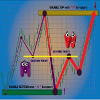Edit Your Comment
Trading multiple currency pairs
Biedrs kopš
3 ieraksti
Apr 14, 2015 at 20:06
Biedrs kopš
3 ieraksti
Hi,
I'd like to discuss how you deal with the correlation of FOREX pairs.
I think we all know that in some way all forex pairs are related to one another. The two leading currencies that guide the way are EUR and USD.
Now, it often happens that I see signals in multiple currency pairs that correlate to each other. For example, yesterday signals got generated for me in all EUR-currencies, from EURUSD all the way down to EURJPY and EURGBP / EURCHF.
I did open trades on them and they all went into the same direction. When EURUSD was in correction, so were the others.
So, essentially, while it was valid for me to trade these signals from a technical standpoint and I did stay true to my money- / risk mangement, it felt like putting my risk into a single trade because they were all moving as if they were one.
How do you handle trading multiple currency pairs with EUR or USD? Do you just pick out the best signal and stick ONLY to that, or do you trade them all? After all, they do not move EXACTLY the same all the time. But more often than not, they do.
I'd like to discuss how you deal with the correlation of FOREX pairs.
I think we all know that in some way all forex pairs are related to one another. The two leading currencies that guide the way are EUR and USD.
Now, it often happens that I see signals in multiple currency pairs that correlate to each other. For example, yesterday signals got generated for me in all EUR-currencies, from EURUSD all the way down to EURJPY and EURGBP / EURCHF.
I did open trades on them and they all went into the same direction. When EURUSD was in correction, so were the others.
So, essentially, while it was valid for me to trade these signals from a technical standpoint and I did stay true to my money- / risk mangement, it felt like putting my risk into a single trade because they were all moving as if they were one.
How do you handle trading multiple currency pairs with EUR or USD? Do you just pick out the best signal and stick ONLY to that, or do you trade them all? After all, they do not move EXACTLY the same all the time. But more often than not, they do.
Biedrs kopš
39 ieraksti
Apr 15, 2015 at 09:52
Biedrs kopš
39 ieraksti
Hey Sebastian,
This is my "opinion" on handling these situations;
1) Break up the pairs into groups to try and avoid trading correlated pairs (and now groups since they are separated), the reason is to mitigate risk by not being exposed to all the pairs. Yes, sometimes the trade(s) work out fine however, as you saw you probably could have risked the same amount on a single EURUSD trade. This would have allowed to you focus on 1 trade rather than multiple trades.
That said if you have the same setup and follow your trade rules and have a signal there is not a logical reason to not take the trade unless you are over exposing your position.
2) An interesting trading strategy that works (sometimes); I have used the correlation in the past to pickup trades I missed. This doesn't always work but I found that many pairs follow a move sometimes hours later.
What you really have to watch for if trying this is the ATR of the pair. When looking for these setups you often have to set smaller profit targets, do to the fact that most minor correlated pairs do not have the ATR of the major pairs.
Personally, I try not to trade correlated pairs and most of the time when back testing I do create currency groups based on different criteria and one of those is correlation.
Great Trading!
This is my "opinion" on handling these situations;
1) Break up the pairs into groups to try and avoid trading correlated pairs (and now groups since they are separated), the reason is to mitigate risk by not being exposed to all the pairs. Yes, sometimes the trade(s) work out fine however, as you saw you probably could have risked the same amount on a single EURUSD trade. This would have allowed to you focus on 1 trade rather than multiple trades.
That said if you have the same setup and follow your trade rules and have a signal there is not a logical reason to not take the trade unless you are over exposing your position.
2) An interesting trading strategy that works (sometimes); I have used the correlation in the past to pickup trades I missed. This doesn't always work but I found that many pairs follow a move sometimes hours later.
What you really have to watch for if trying this is the ATR of the pair. When looking for these setups you often have to set smaller profit targets, do to the fact that most minor correlated pairs do not have the ATR of the major pairs.
Personally, I try not to trade correlated pairs and most of the time when back testing I do create currency groups based on different criteria and one of those is correlation.
Great Trading!
Biedrs kopš
2 ieraksti
Apr 16, 2015 at 06:43
Biedrs kopš
2 ieraksti
I agree.
In my experience it is better to just trade what you personally believe to be the best setup.
When I am in this situation I try to pair a strongest currencies (USD, GDP, NZD) vs the weakest currencies (EUR, AUD, CAD) that have the greatest risk to reward ratio.
Good luck!
In my experience it is better to just trade what you personally believe to be the best setup.
When I am in this situation I try to pair a strongest currencies (USD, GDP, NZD) vs the weakest currencies (EUR, AUD, CAD) that have the greatest risk to reward ratio.
Good luck!
Biedrs kopš
27 ieraksti
May 01, 2015 at 07:57
Biedrs kopš
27 ieraksti
To trade a multiply pairs, you need to identify the strength of the currency.. combine with the high news impact and technical.. i have heard the 'oasis technique' which analyse on currency strength.. just google it for your better understanding.. good luck
be calm, the world is in your hand
Biedrs kopš
342 ieraksti
May 01, 2015 at 15:10
Biedrs kopš
342 ieraksti
Take a look at eurusd and usdchf, they appear correlated (-90% or so), but then take a look at eurchf, if those two were really correlated eurchf won't be able to go anywhere, but it does.
Over long term the correlations always break down eventually. Like when the CHF peg broke.
I use to do things like wait for the correlation to break down short term and then take the position for the return to normal, but now days I don't really worry about it anymore. Just a waste of time. I allocate each pair I trade it's own chunck of cash in hand and that's that.
I often find I'll end up closing out a eurusd short with a usdchf long just to 10 minutes later close out a eurusd short with a usdchf short. Day-to-day the correlations are all over the place, they only really hold for the big moves and you don't really want to hedge for those ! Unless of course one cy experience a major catastrophy. Like CHF did.
Spread the risk mate, the more pairs the better. I trade 28 pairs, 8 cy's. So if something gets hit it's 1/8 th of my portfolio that takes the hit.
Over long term the correlations always break down eventually. Like when the CHF peg broke.
I use to do things like wait for the correlation to break down short term and then take the position for the return to normal, but now days I don't really worry about it anymore. Just a waste of time. I allocate each pair I trade it's own chunck of cash in hand and that's that.
I often find I'll end up closing out a eurusd short with a usdchf long just to 10 minutes later close out a eurusd short with a usdchf short. Day-to-day the correlations are all over the place, they only really hold for the big moves and you don't really want to hedge for those ! Unless of course one cy experience a major catastrophy. Like CHF did.
Spread the risk mate, the more pairs the better. I trade 28 pairs, 8 cy's. So if something gets hit it's 1/8 th of my portfolio that takes the hit.
Biedrs kopš
1601 ieraksti
May 01, 2015 at 16:51
Biedrs kopš
1601 ieraksti
Lukkulaki posted:
I agree.
In my experience it is better to just trade what you personally believe to be the best setup.
When I am in this situation I try to pair a strongest currencies (USD, GDP, NZD) vs the weakest currencies (EUR, AUD, CAD) that have the greatest risk to reward ratio.
Good luck!
This is the way to do... You need a method that tells you in real time what is the strongest vs weakest... and you can't be wrong.
Biedrs kopš
14 ieraksti
May 03, 2015 at 06:23
Biedrs kopš
14 ieraksti
I agree with above comments it depends on your strategy.
but Money management is the KEY.
firstly, you need to set your risk % per trade and then risk % per account.
so lets say if you set 1% max per trade and 2 % per account
then if we see setup on 4 different currency you can take 0.5% on each that gives you 2% max per account.
if you see 2 setups you could just take 2 trades with 1% each
or just stick with strongest setup but I would suggest avoid taking highly correlated pairs in same directions to lower risk.
few are below
EURUSD, GBPUSD
EURNZD, GBPNZD
EURCAD, GBPCAD
EURAUD, GBPAUD
EURJBP, GBPJPY
AUDJPY, NZDJPY
pairs you where trading are less correlated.
Hope this help
but Money management is the KEY.
firstly, you need to set your risk % per trade and then risk % per account.
so lets say if you set 1% max per trade and 2 % per account
then if we see setup on 4 different currency you can take 0.5% on each that gives you 2% max per account.
if you see 2 setups you could just take 2 trades with 1% each
or just stick with strongest setup but I would suggest avoid taking highly correlated pairs in same directions to lower risk.
few are below
EURUSD, GBPUSD
EURNZD, GBPNZD
EURCAD, GBPCAD
EURAUD, GBPAUD
EURJBP, GBPJPY
AUDJPY, NZDJPY
pairs you where trading are less correlated.
Hope this help
Biedrs kopš
875 ieraksti
Feb 26, 2019 at 13:30
Biedrs kopš
875 ieraksti
I am also trading with multiple trading pairs; depending on only one-two trading pair is risky according to my own trading experience.
keeping patience.......
Biedrs kopš
598 ieraksti
May 09, 2019 at 08:24
Biedrs kopš
598 ieraksti
all currencies in Forex trading are good, just we have to experience with them by trading . We can trade all major currency in our demo account. Because we can see here the pairs performance how it works.

*Spams netiks pieļauts, un tā rezultātā var slēgt kontu.
Tip: Posting an image/youtube url will automatically embed it in your post!
Tip: Type the @ sign to auto complete a username participating in this discussion.















